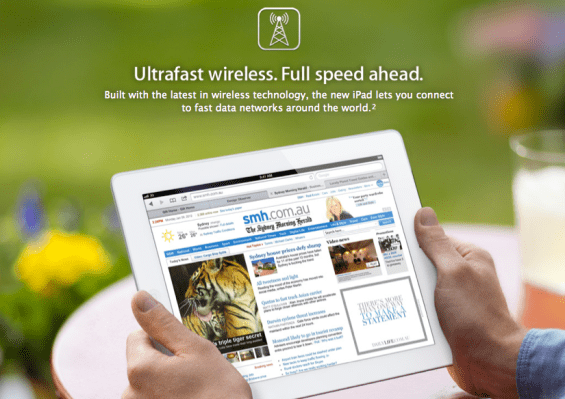One of the selling points for the new iPad has been the fact that it supports 4G, but at least in one market, that 4G promise is facing a challenge. In what might be a case of a storm in a teapot, the Competition and Consumer Commission in Australia has said that Apple cannot advertise its newest tablet as 4G-capable because it doesn’t actually work on the 4G network that exists in the country.
The regulator plans to take its argument to federal court this Wednesday, where it will try to order Apple to change its marketing of the product. It also wants Apple to offer refunds to any buyers that feel they have been mislead by the advertising. Update: Reuters writes that Apple has now said that it will write to all of those who have purchased the iPad to date in Australia and offer a refund.
Australia currently has one 4G network in operation — offered by the incumbent carrier Telstra — but according to this Reuters story, that network runs on a band of spectrum not supported in the new iPad.
Apple’s Australian website now sports a customized page pointing users to the ultra-fast network availability in the country with a screenshot of one of the leading daily newspapers, the Sydney Morning Herald (pictured above).
There is also a separate link taking users to a page describing how to get data access on the device, including 4G, listing carriers that offer access.
But there is a slightly ridiculous element to this story: Apple on its Australian site has simply replicated much of the marketing material it is using elsewhere. In countries like the UK, it also mentions 4G and LTE, but forget about getting that here: the regulator here hasn’t even started issuing licenses for the spectrum. The question is whether users — not just in Australia but in other countries where the 4G doesn’t work — really buying the devices thinking they are getting 4G when they are not?
Another point to consider is that it appears so far, the tablets and data plans using cellular access are not actually selling as well as those for WiFi-only tablets. A report from Localytics last week found that only about 6 percent of all traffic coming from iPad tablets originated from cellular networks; the rest came via WiFi. Statistics like that make this kind of complaint from the regulator seem like a storm in a teapot.
Australia’s courts have been a friend and foe to Apple in the past year over other issues, specifically around patents. Apple succeeded in getting Samsung to temporarily stop selling its 10-inch Galaxy Tab tablet just as it was trying to launch the product, claiming that it infringed on patents. Ultimately, however, Samsung’s side was upheld in that case and those bans were lifted, in a case that is still ongoing.
